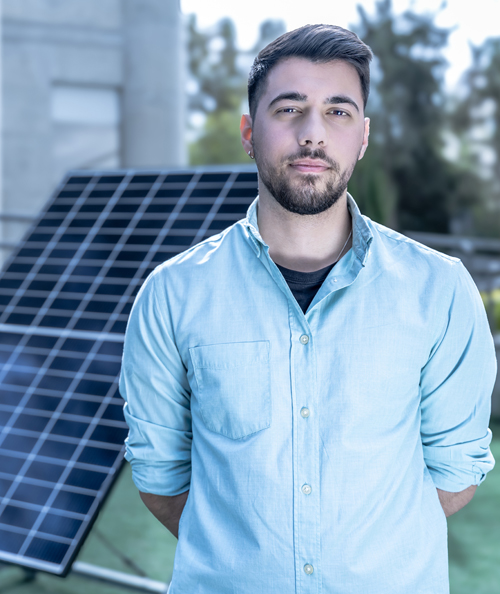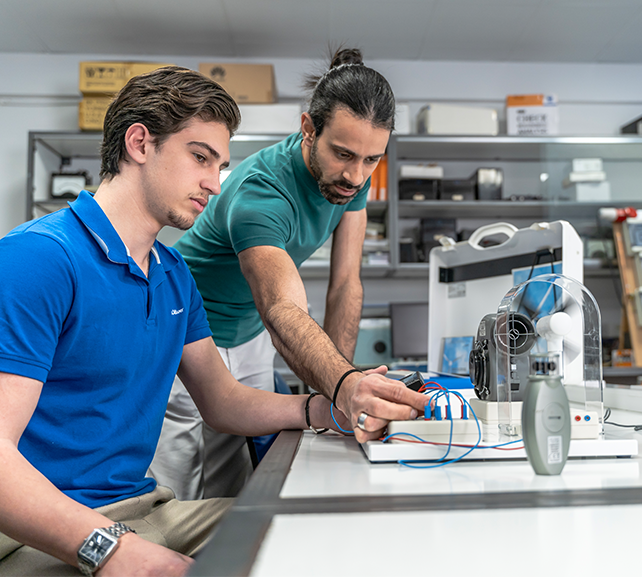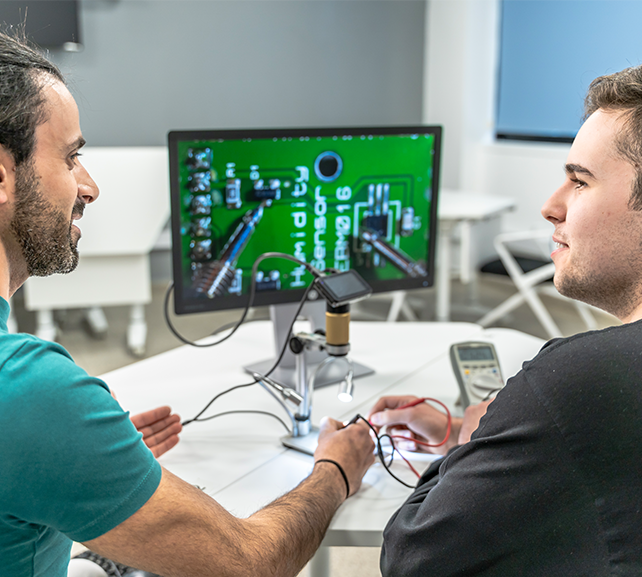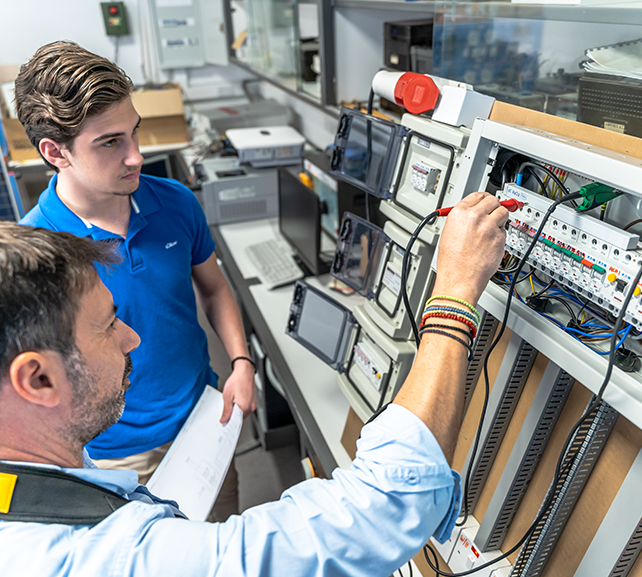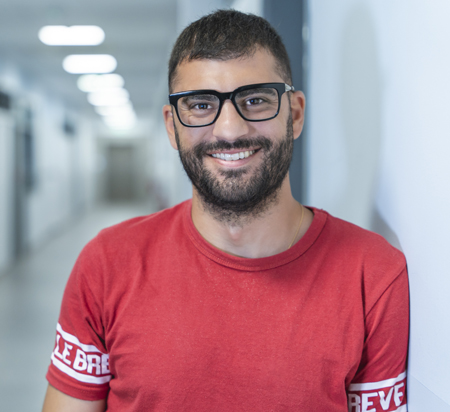PROGRAM DETAILS
Duration4 years (full time)
Fees
€9,300 per year
LanguageEnglish
CampusNicosia - Limassol
The program of BSc in Electrical Engineering is designed for students aiming to acquire broad theoretical and technical knowledge in the multidisciplinary field of Electrical Engineering. The program equips the students with skills and experience in the engineering design process and the solution of engineering problems, related to generation transmission and distribution of Electric Power via conventional or renewable energy sources, Analog and Digital Electronic Systems, Telecommunication Systems and Automation and Control Systems. The courses offered, are strongly supported by relevant laboratory infrastructure of the latest technology and constitute a balance between theoretical and practical study of the above electrical engineering systems study and their implementation in real world applications. The students are involved in research activities in key technology fields, have the opportunity to gain work experience through industrial placements and the graduates are prepared for direct employment as electrical engineers with the foundation for further graduate and research studies in the field.|
Specialization in Renewable Energy Sources and Sustainable Energy Systems
In addition to the General Electrical Engineering direction, the specialization of Renewable Energy Sources and Sustainable Energy Systems is offered for Electrical Engineering students aiming to prepare them for career and immediate contribution to the industry and society in the above field, through the design, development, construction, application, operation and maintenance of renewable energy systems and the promotion of more sustainable living through the implementation of new technologies and innovations.
The language of instruction for both the general direction and the specialization is English.
- Apply appropriate mathematical, science and engineering methods and use computer software to solve electrical engineering related problems.
- Use state-of-the-art Electronic Design Automation (EDA) software and hardware tools, as well as laboratory equipment to design, test and evaluate analogue and digital systems.
- Design, program, develop and evaluate electronic systems as well as automation systems based on PLCs and embedded systems, or integrated of-the-shelf components to meet defined and specified requirements.
- Analyze and design reliable analog and digital communication systems.
- Use analytical methods and modelling techniques to evaluate electrical engineering systems (control, communication, power, electronic) and components in terms of general quality attributes and possible trade-offs presented within the given problem.
- Evaluate the capabilities and limitations of existing and emerging technologies in the field of power generation and distribution using sustainable and renewable energy sources.
- Assess the capabilities and limitations of existing and emerging communication systems.
- Demonstrate awareness on the forefront of knowledge in the field of electrical engineering and on the emerging information and communication technologies.
- Demonstrate awareness on the role of engineers in society and the professional and ethical responsibilities of engineers.
- Retrieve and analyze information from different sources, including information retrieval through databases and on-line computer searches.
- Demonstrate competency in oral and written communication skills, as well as in the use of relevant computing technologies and tools.
Candidates can be admitted to the Program only if they satisfy the general admission requirements of the University.
For the Electrical Engineering BSc program, all candidates must take a placement test in Mathematics and English, prior to their enrolment in the Program. Candidates who fail the placement test must enrol under a probation status and are required to register to relevant foundation courses. Student workload for these foundation courses is accounted in the total student workload, which is limited to the maximum of 30 ETCS per semester.
Recognition of Prior Learning
Candidates who have completed university level work in an accredited program are eligible to apply for transfer admission. Candidates can be granted transfer credits according to the general arrangements for recognition of prior learning of the University.
There are no specific examination regulations, assessment and grading methods employed by this Program. The examination regulations, assessment methods and grading system for this Program are the same as the relevant general university regulations.
Graduation Requirements
Students are eligible for graduation after successfully completing 240 ECTS credits in the courses listed in the Program Structure.
Furthermore, a student can graduate only if their CGPA is greater or equal to 5.00 out of 10.00. Graduating students with a CGPA less than 5.00 might have to take extra courses or repeat a number of courses in order to improve their grades.
Access to Further Studies
The graduates of the Program have access to graduate studies (2nd and 3rd Cycle) in disciplines related with the discipline of electrical engineering.
General Electrical Engineering
Module Group
ECTS
The student must successfully complete 200 ECTS, from the following list of modules:
| No. | Code | Name | ECTS | Hours / week |
|---|---|---|---|---|
| 1 | ACOE161 | DIGITAL LOGIC | 5 | 3+2 |
| 2 | ACOE201 | COMPUTER ORGANISATION AND ARCHITECTURE | 5 | 3+2 |
| 3 | ACOE343 | REAL TIME EMBEDDED SYSTEMS | 6 | 2+2 |
| 4 | ACSC182 | PROGRAMMING PRINCIPLES I | 5 | 2+2 |
| 5 | AEEE192 | DIGITAL SYSTEMS DESIGN | 5 | 3 |
| 6 | AEEE222 | CIRCUIT ANALYSIS I | 5 | 3+1 |
| 7 | AEEE223 | CIRCUIT ANALYSIS II | 5 | 3+1 |
| 8 | AEEE225 | INSTRUMENTATION AND MEASUREMENTS | 5 | 3+1 |
| 9 | AEEE238 | ELECTRONICS I | 5 | 3+1 |
| 10 | AEEE239 | ELECTRONICS II | 5 | 3+1 |
| 11 | AEEE298 | ELECTRICAL ENGINEERING WORKSHOP | 5 | 2+2 |
| 12 | AEEE305 | RANDOM SIGNALS AND SYSTEMS | 5 | 3 |
| 13 | AEEE310 | SIGNALS SYSTEMS AND TRANSFORMS | 6 | 3 |
| 14 | AEEE312 | INTRODUCTION TO ELECTROMAGNETICS | 6 | 3 |
| 15 | AEEE313 | TRANSMISSION LINES AND WAVES | 6 | 3+1 |
| 16 | AEEE319 | COMPUTATIONAL METHODS FOR ELECTRICAL ENGINEERS | 5 | 3 |
| 17 | AEEE321 | COMMUNICATION SYSTEMS I | 6 | 3+1 |
| 18 | AEEE323 | ELECTRICAL ENGINEERING PROBLEM SOLVING USING MATLAB AND SIMULINK | 6 | 3+2 |
| 19 | AEEE345 | CONTROL ENGINEERING | 6 | 3+1 |
| 20 | AEEE349 | GENERATION AND TRANSMISSION OF ELECTRICAL ENERGY | 5 | 3 |
| 21 | AEEE351 | POWER SYSTEM ANALYSIS | 6 | 3+1 |
| 22 | AEEE352 | ELECTRICAL MACHINES | 6 | 3+1 |
| 23 | AEEE414 | ROBOTICS | 6 | 3 |
| 24 | AEEE422 | COMMUNICATION SYSTEMS II | 6 | 3+1 |
| 25 | AEEE424 | DIGITAL SIGNAL PROCESSING | 6 | 3 |
| 26 | AEEE456 | POWER ELECTRONICS | 6 | 3 |
| 27 | AEEE498 | INTRODUCTION TO SENIOR PROJECT | 6 | 3 |
| 28 | AEEE499 | SENIOR PROJECT | 6 | 1 |
| 29 | AENG201 | TECHNICAL WRITING AND COMMUNICATION | 5 | 3 |
| 30 | AMAT111 | CALCULUS AND ANALYTIC GEOMETRY I | 5 | 3 |
| 31 | AMAT122 | CALCULUS AND ANALYTIC GEOMETRY II | 5 | 3 |
| 32 | AMAT181 | LINEAR ALGEBRA WITH MATLAB | 5 | 3 |
| 33 | AMAT204 | DIFFERENTIAL EQUATIONS | 5 | 3 |
| 34 | AMAT223 | CALCULUS III | 5 | 3 |
| 35 | APHY111 | PHYSICS I | 5 | 3+1 |
| 36 | APHY112 | PHYSICS II | 5 | 3+1 |
| 37 | AEEE170 | ELECTRICAL PRINCIPLES | 5 | 3+1 |
The student must successfully complete 30 ECTS, from the following list of modules:
| No. | Code | Name | ECTS | Hours / week |
|---|---|---|---|---|
| 1 | ACOE313 | COMPUTER NETWORKS I | 6 | 3+1 |
| 2 | ACOE323 | COMPUTER NETWORKS II | 6 | 3 |
| 3 | ACSC183 | PROGRAMMING PRINCIPLES II | 6 | 3+1 |
| 4 | ACSC368 | ARTIFICIAL INTELLIGENCE | 6 | 3 |
| 5 | AEEE138 | ELECTRICAL AND ELECTRONIC MATERIALS AND DEVICES | 6 | 3 |
| 6 | AEEE419 | DIGITAL IMAGE PROCESSING | 6 | 3 |
| 7 | AEEE423 | RF ENGINEERING | 6 | 3 |
| 8 | AEEE425 | ANTENNAS AND RADARS | 6 | 3 |
| 9 | AEEE431 | MODERN CONTROL SYSTEMS ANALYSIS | 6 | 3 |
| 10 | AEEE432 | DYNAMIC CONTROL SYSTEMS LABORATORY | 6 | 3 |
| 11 | AEEE433 | DISCRETE CONTROL SYSTEMS | 6 | 3 |
| 12 | AEEE434 | INTRODUCTION TO OPTIMIZATION METHODS AND APPLICATIONS | 6 | 3 |
| 13 | AEEE435 | PROGRAMMABLE LOGIC CONTROLLERS FOR INDUSTRIAL APPLICATIONS | 6 | 3 |
| 14 | AEEE438 | VLSI DESIGN | 6 | 3 |
| 15 | AEEE444 | WIRELESS COMMUNICATIONS | 6 | 3 |
| 16 | AEEE450 | IEE WIRING REGULATIONS PART I | 6 | 3 |
| 17 | AEEE451 | IEE WIRING REGULATIONS PART II | 6 | 3 |
| 18 | AEEE452 | ELECTRICAL INSTALLATION DESIGN AND APPLICATIONS | 6 | 3 |
| 19 | AEEE454 | BASIC POWER SYSTEM PROTECTION | 6 | 3 |
| 20 | AEEE455 | POWER SYSTEM CONTROL AND STABILITY | 6 | 3 |
| 21 | AEEE457 | RENEWABLE ENERGY SOURCES | 6 | 3 |
| 22 | AEEE458 | LIGHTING ENGINEERING | 6 | 3 |
| 23 | AEEE470 | INDUSTRIAL PLACEMENT IN ELECTRICAL ENGINEERING | 6 | 3 |
| 24 | AEEE471 | SPECIAL TOPICS IN ELECTRICAL ENGINEERING I | 6 | 3 |
| 25 | AEEE472 | SPECIAL TOPICS IN ELECTRICAL ENGINEERING II | 6 | 3 |
| 26 | AEEE493 | FIBER OPTIC COMMUNICATIONS | 6 | 3 |
Total
240
Semesters
ECTS
| No. | Code | Name | ECTS |
|---|---|---|---|
| 1 | ACSC182 | PROGRAMMING PRINCIPLES I | 5 |
| 2 | AEEE170 | ELECTRICAL PRINCIPLES | 5 |
| 3 | AMAT111 | CALCULUS AND ANALYTIC GEOMETRY I | 5 |
| 4 | AMAT181 | LINEAR ALGEBRA WITH MATLAB | 5 |
| 5 | APHY111 | PHYSICS I | 5 |
| 6 | FREE ELECTIVE | 5 | |
| TOTAL | 30 |
| No. | Code | Name | ECTS |
|---|---|---|---|
| 1 | ACOE161 | DIGITAL LOGIC | 5 |
| 2 | AEEE222 | CIRCUIT ANALYSIS I | 5 |
| 3 | AEEE238 | ELECTRONICS I | 5 |
| 4 | AMAT122 | CALCULUS AND ANALYTIC GEOMETRY II | 5 |
| 5 | APHY112 | PHYSICS II | 5 |
| 6 | FREE ELECTIVE | 5 | |
| TOTAL | 30 |
| No. | Code | Name | ECTS |
|---|---|---|---|
| 1 | ACOE201 | COMPUTER ORGANISATION AND ARCHITECTURE | 5 |
| 2 | AEEE192 | DIGITAL SYSTEMS DESIGN | 5 |
| 3 | AEEE223 | CIRCUIT ANALYSIS II | 5 |
| 4 | AEEE225 | INSTRUMENTATION AND MEASUREMENTS | 5 |
| 5 | AENG201 | TECHNICAL WRITING AND COMMUNICATION | 5 |
| 6 | AMAT204 | DIFFERENTIAL EQUATIONS | 5 |
| TOTAL | 30 |
| No. | Code | Name | ECTS |
|---|---|---|---|
| 1 | AEEE239 | ELECTRONICS II | 5 |
| 2 | AEEE298 | ELECTRICAL ENGINEERING WORKSHOP | 5 |
| 3 | AEEE305 | RANDOM SIGNALS AND SYSTEMS | 5 |
| 4 | AEEE319 | COMPUTATIONAL METHODS FOR ELECTRICAL ENGINEERS | 5 |
| 5 | AEEE349 | GENERATION AND TRANSMISSION OF ELECTRICAL ENERGY | 5 |
| 6 | AMAT223 | CALCULUS III | 5 |
| TOTAL | 30 |
| No. | Code | Name | ECTS |
|---|---|---|---|
| 1 | AEEE310 | SIGNALS SYSTEMS AND TRANSFORMS | 6 |
| 2 | AEEE312 | INTRODUCTION TO ELECTROMAGNETICS | 6 |
| 3 | AEEE345 | CONTROL ENGINEERING | 6 |
| 4 | AEEE351 | POWER SYSTEM ANALYSIS | 6 |
| 5 | AEEE456 | POWER ELECTRONICS | 6 |
| TOTAL | 30 |
| No. | Code | Name | ECTS |
|---|---|---|---|
| 1 | AEEE313 | TRANSMISSION LINES AND WAVES | 6 |
| 2 | AEEE321 | COMMUNICATION SYSTEMS I | 6 |
| 3 | AEEE323 | ELECTRICAL ENGINEERING PROBLEM SOLVING USING MATLAB AND SIMULINK | 6 |
| 4 | AEEE352 | ELECTRICAL MACHINES | 6 |
| 5 | TECHNICAL ELECTIVE | 6 | |
| TOTAL | 30 |
| No. | Code | Name | ECTS |
|---|---|---|---|
| 1 | AEEE414 | ROBOTICS | 6 |
| 2 | AEEE422 | COMMUNICATION SYSTEMS II | 6 |
| 3 | AEEE498 | INTRODUCTION TO SENIOR PROJECT | 6 |
| 4 | TECHNICAL ELECTIVE | 6 | |
| 5 | TECHNICAL ELECTIVE | 6 | |
| TOTAL | 30 |
| No. | Code | Name | ECTS |
|---|---|---|---|
| 1 | ACOE343 | REAL TIME EMBEDDED SYSTEMS | 6 |
| 2 | AEEE424 | DIGITAL SIGNAL PROCESSING | 6 |
| 3 | AEEE499 | SENIOR PROJECT | 6 |
| 4 | TECHNICAL ELECTIVE | 6 | |
| 5 | TECHNICAL ELECTIVE | 6 | |
| TOTAL | 30 |
Specialization: Renewable Energy Sources and Sustainable Energy Systems
Module Group
ECTS
The student must successfully complete 206 ECTS, from the following list of modules:
| No. | Code | Name | ECTS | Hours / week |
|---|---|---|---|---|
| 1 | AEEE170 | ELECTRICAL PRINCIPLES | 5 | 3+1 |
| 2 | ACSC182 | PROGRAMMING PRINCIPLES I | 5 | 2+2 |
| 3 | AMAT111 | CALCULUS AND ANALYTIC GEOMETRY I | 5 | 3 |
| 4 | AMAT181 | LINEAR ALGEBRA WITH MATLAB | 5 | 3 |
| 5 | APHY111 | PHYSICS I | 5 | 3+1 |
| 6 | ACOE161 | DIGITAL LOGIC | 5 | 3+2 |
| 7 | AEEE222 | CIRCUIT ANALYSIS I | 5 | 3+1 |
| 8 | AEEE238 | ELECTRONICS I | 5 | 3+1 |
| 9 | AMAT122 | CALCULUS AND ANALYTIC GEOMETRY II | 5 | 3 |
| 10 | APHY112 | PHYSICS II | 5 | 3+1 |
| 11 | ACOE201 | COMPUTER ORGANISATION AND ARCHITECTURE | 5 | 3+2 |
| 12 | AEEE192 | DIGITAL SYSTEMS DESIGN | 5 | 3 |
| 13 | AEEE223 | CIRCUIT ANALYSIS II | 5 | 3+1 |
| 14 | AEEE225 | INSTRUMENTATION AND MEASUREMENTS | 5 | 3+1 |
| 15 | AENG201 | TECHNICAL WRITING AND COMMUNICATION | 5 | 3 |
| 16 | AMAT204 | DIFFERENTIAL EQUATIONS | 5 | 3 |
| 17 | AEEE239 | ELECTRONICS II | 5 | 3+1 |
| 18 | AEEE298 | ELECTRICAL ENGINEERING WORKSHOP | 5 | 2+2 |
| 19 | AEEE305 | RANDOM SIGNALS AND SYSTEMS | 5 | 3 |
| 20 | AEEE319 | COMPUTATIONAL METHODS FOR ELECTRICAL ENGINEERS | 5 | 3 |
| 21 | AEEE349 | GENERATION AND TRANSMISSION OF ELECTRICAL ENERGY | 5 | 3 |
| 22 | AMAT223 | CALCULUS III | 5 | 3 |
| 23 | AEEE260 | INTRODUCTION TO RENEWABLE ENERGY SYSTEMS | 6 | 3+1 |
| 24 | AEEE310 | SIGNALS SYSTEMS AND TRANSFORMS | 6 | 3 |
| 25 | AEEE312 | INTRODUCTION TO ELECTROMAGNETICS | 6 | 3 |
| 26 | AEEE351 | POWER SYSTEM ANALYSIS | 6 | 3+1 |
| 27 | AEEE361 | SUSTAINABLE ENERGY I | 6 | 3 |
| 28 | AEEE313 | TRANSMISSION LINES AND WAVES | 6 | 3+1 |
| 29 | AEEE321 | COMMUNICATION SYSTEMS I | 6 | 3+1 |
| 30 | AEEE352 | ELECTRICAL MACHINES | 6 | 3+1 |
| 31 | AEEE360 | SOLAR ENERGY | 6 | 3 |
| 32 | AEEE362 | WIND ENERGY | 6 | 3 |
| 33 | AEEE345 | CONTROL ENGINEERING | 6 | 3+1 |
| 34 | AEEE460 | DESIGN OF PHOTOVOLTAIC SYSTEMS | 6 | 3 |
| 35 | AEEE461 | RENEWABLE ENERGY SOURCES INSTRUMENTATION AND MEASUREMENTS | 6 | 3 |
| 36 | AEEE498 | INTRODUCTION TO SENIOR PROJECT | 6 | 3 |
| 37 | AEEE424 | DIGITAL SIGNAL PROCESSING | 6 | 3 |
| 38 | AEEE499 | RES & SES SENIOR PROJECT | 6 | 3 |
The student must successfully complete 24 ECTS, from the following list of modules:
| No. | Code | Name | ECTS | Hours / week |
|---|---|---|---|---|
| 1 | AEEE458 | LIGHTING ENGINEERING | 6 | 3 |
| 2 | AEEE462 | SMART GRIDS AND CONTROL | 6 | 3 |
| 3 | AEEE463 | THIN FILM SOLAR CELLS | 6 | 3 |
| 4 | AEEE464 | POWER ELECTRONICS FOR RENEWABLE ENERGY SYSTEMS | 6 | 3 |
| 5 | AEEE465 | NANOTECHNOLOGY APPLICATIONS | 6 | 3 |
| 6 | AEEE466 | SUSTAINABLE ENERGY II | 6 | 3 |
| 7 | AEEE470 | INDUSTRIAL PLACEMENT IN ELECTRICAL ENGINEERING | 6 | 3 |
| 8 | AEEE473 | SPECIAL TOPICS IN RES & SES ENGINEERING I | 6 | 3 |
| 9 | AEEE474 | SPECIAL TOPICS IN RES & SES ELECTRICAL ENGINEERING II | 6 | 3 |
Total
240
Semesters
ECTS
| No. | Code | Name | ECTS |
|---|---|---|---|
| 1 | ACSC182 | PROGRAMMING PRINCIPLES I | 5 |
| 2 | AEEE170 | ELECTRICAL PRINCIPLES | 5 |
| 3 | AMAT111 | CALCULUS AND ANALYTIC GEOMETRY I | 5 |
| 4 | AMAT181 | LINEAR ALGEBRA WITH MATLAB | 5 |
| 5 | APHY111 | PHYSICS I | 5 |
| 6 | FREE ELECTIVE | 5 | |
| TOTAL | 30 |
| No. | Code | Name | ECTS |
|---|---|---|---|
| 1 | ACOE161 | DIGITAL LOGIC | 5 |
| 2 | AEEE222 | CIRCUIT ANALYSIS I | 5 |
| 3 | AEEE238 | ELECTRONICS I | 5 |
| 4 | AMAT122 | CALCULUS AND ANALYTIC GEOMETRY II | 5 |
| 5 | APHY112 | PHYSICS II | 5 |
| 6 | FREE ELECTIVE | 5 | |
| TOTAL | 30 |
| No. | Code | Name | ECTS |
|---|---|---|---|
| 1 | ACOE201 | COMPUTER ORGANISATION AND ARCHITECTURE | 5 |
| 2 | AEEE192 | DIGITAL SYSTEMS DESIGN | 5 |
| 3 | AEEE223 | CIRCUIT ANALYSIS II | 5 |
| 4 | AEEE225 | INSTRUMENTATION AND MEASUREMENTS | 5 |
| 5 | AENG201 | TECHNICAL WRITING AND COMMUNICATION | 5 |
| 6 | AMAT204 | DIFFERENTIAL EQUATIONS | 5 |
| TOTAL | 30 |
| No. | Code | Name | ECTS |
|---|---|---|---|
| 1 | AEEE239 | ELECTRONICS II | 5 |
| 2 | AEEE298 | ELECTRICAL ENGINEERING WORKSHOP | 5 |
| 3 | AEEE305 | RANDOM SIGNALS AND SYSTEMS | 5 |
| 4 | AEEE319 | COMPUTATIONAL METHODS FOR ELECTRICAL ENGINEERS | 5 |
| 5 | AEEE349 | GENERATION AND TRANSMISSION OF ELECTRICAL ENERGY | 5 |
| 6 | AMAT223 | CALCULUS III | 5 |
| TOTAL | 30 |
| No. | Code | Name | ECTS |
|---|---|---|---|
| 1 | AEEE260 | INTRODUCTION TO RENEWABLE ENERGY SYSTEMS | 6 |
| 2 | AEEE310 | SIGNALS SYSTEMS AND TRANSFORMS | 6 |
| 3 | AEEE312 | INTRODUCTION TO ELECTROMAGNETICS | 6 |
| 4 | AEEE351 | POWER SYSTEM ANALYSIS | 6 |
| 5 | AEEE361 | SUSTAINABLE ENERGY I | 6 |
| TOTAL | 30 |
| No. | Code | Name | ECTS |
|---|---|---|---|
| 1 | AEEE313 | TRANSMISSION LINES AND WAVES | 6 |
| 2 | AEEE321 | COMMUNICATION SYSTEMS I | 6 |
| 3 | AEEE352 | ELECTRICAL MACHINES | 6 |
| 4 | AEEE360 | SOLAR ENERGY | 6 |
| 5 | AEEE362 | WIND ENERGY | 6 |
| TOTAL | 30 |
| No. | Code | Name | ECTS |
|---|---|---|---|
| 1 | AEEE345 | CONTROL ENGINEERING | 6 |
| 2 | AEEE460 | DESIGN OF PHOTOVOLTAIC SYSTEMS | 6 |
| 3 | AEEE461 | RENEWABLE ENERGY SOURCES INSTRUMENTATION AND MEASUREMENTS | 6 |
| 4 | AEEE498 | INTRODUCTION TO SENIOR PROJECT | 6 |
| 5 | TECHNICAL ELECTIVE | 6 | |
| TOTAL | 30 |
| No. | Code | Name | ECTS |
|---|---|---|---|
| 1 | AEEE424 | DIGITAL SIGNAL PROCESSING | 6 |
| 2 | AEEE499 | RES & SES SENIOR PROJECT | 6 |
| 3 | TECHNICAL ELECTIVE | 6 | |
| 4 | TECHNICAL ELECTIVE | 6 | |
| 5 | TECHNICAL ELECTIVE | 6 | |
| TOTAL | 30 |
The delivery of the program of study is supported by the following members of staff:
| Rank | Name |
|---|---|
| Professor | Dr. Haris Charalambous |
| Professor | Prof. Michael Komodromos |
| Professor | Prof. Costas Kyriacou |
| Professor | Dr. Symeon Nikolaou |
| Professor - Programme Coordinator | Prof. Christos Themistos |
| Associate Professor | Dr. Nicolas Christofides |
| Associate Professor | Dr. Chrysostomos Chrysostomou |
| Associate Professor | Dr. Andreas Constantinides |
| Associate Professor | Dr. Giorgos Demetriou |
| Associate Professor | Dr. Theodoros Leontiou |
| Associate Professor | Dr. Marios Lestas |
| Associate Professor | Dr. Antonis Papadakis |
| Associate Professor | Dr. Harris Papadopoulos |
| Associate Professor | Dr. Alexis Polycarpou |
| Associate Professor | Dr. Konstantinos Tatas |
| Associate Professor | Dr. Photos Vryonides |
| Assistant Professor | Dr. Marios Charalambides |
| Special Teaching Staff | Ms. Sofi Papatheocharous |
| Postgraduate Associate | Mr. Christophoros Kronis |
| Lab Assistant | Mr. Stylianos Georgiou |
| Lab Assistant | Dr. Marinos Giannakou |



